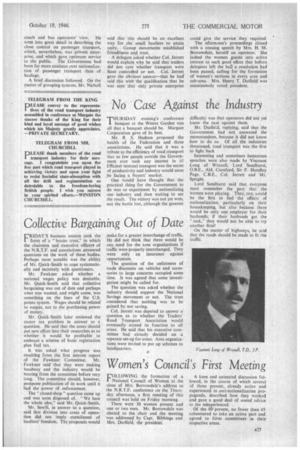Collective Bargaining Out of Date
Page 33

If you've noticed an error in this article please click here to report it so we can fix it.
FRIDAY'S business session took the form of a "brains trust," in which the chairmen and executive officers of the N.R.T.F. and associations answered questions on the work of these bodies. Perhaps most notable was the ability of Mr. Quick-Smith to cope systematically and incisively with questioners.
Mr. Fawkner asked whether a national wages policy was desirable. Mr. Quick-Smith said that collective bargaining was out of date and perhaps what was wanted, and might come, was something on the lines of the U.S. points system. Wages should be related to output, not to the purchasing power of money.
Mr. Quick-Smith later reviewed the motor tax problem in answer to a question. He said that the areas should put new effort into their researches as to whether it would be profitable to embrace a scheme of basic registration plus fuel tax.
It was asked what progress was resulting from the first interim report of the Fawkner Committee. Mr. Fawkner said that they were making headway and the industry would be hearing from the committee before very long. The committee should, however, postpone publication of its work until it had the power of enforcement.
The " closed-shop" question came up and was soon disposed of. " We hate the whole idea," said Mr. Quick-Smith.
Mr. Sewill, in answer to a question, said that division into areas of operation did not imply curtailment of hauliers' freedom. The proposals would make for a greater interchange of traffic. He did not think that there would be any need for the area organizations if traffic were properly interchanged. They were only an insurance against opportunism.
The question of the unfairness of trade discounts on vehicles and accessories to large concerns occupied some time. It was agreed that some investigation might be called for.
The question was asked whether the industry should support the National Savings movement or not. The trust considered that nothing was to be gained by not saving.
Col. Jerrett was deputed to answer a question as to whether the Traders' Road Transport Association would eventually extend its function to all areas. He said that his executive committee had already decided on •a separate set-up for areas. Area organizations were invited to put up schemes to headquarters.












































































